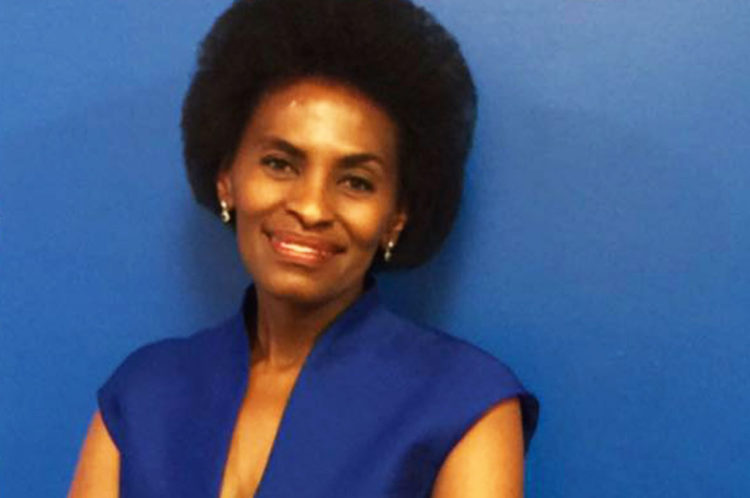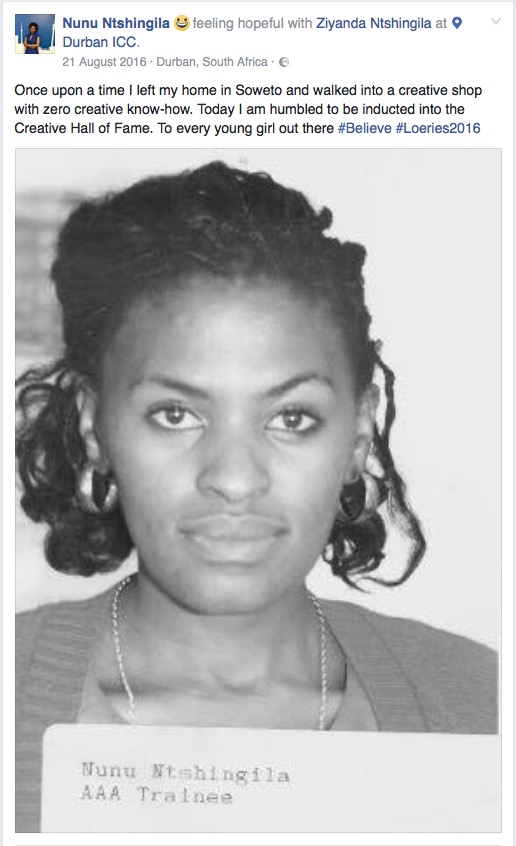People in positions of power know how easy it is to be superficial. Everyone wants an email address, or phone number, a business card, or just the opportunity to pitch a new idea. Being in demand often comes with symptoms of attention deficit disorder. I had heard from our TRUE Africa writer Ndeye Diobaye that Nunu Ntshingila is different.
She is a quiet Soweto girl who, despite knowing nearly nothing about advertising, worked her way up the corporate ladder.
For one, she is a quiet Soweto girl who, despite knowing nearly nothing about advertising, worked her way up the corporate ladder before being elevated to the position of Chairman at Ogilvy & Mather South Africa, one of the continent’s largest agencies. Now, as head of Facebook for Africa, she finds herself navigating an expansion phase where she will need to carefully manage the staggering growth of the social platform.
The company has become so gigantic and so influential that even the most seasoned executives have no choice but to become savvy at negotiating regulatory barriers, juggling complex political agendas and steering users towards new types of experiences. As a new kind of African citizenry consolidates itself through the internet and the newest forms of online communication—Facebook, Messenger, Instagram and WhatsApp being just four platforms in the Facebook ecosystem—a leader in Nunu’s position needs to fight battles on multiple fronts.
Although her company is in the news every day, Nunu seems to be zooming right past the distractions and rumours and focusing instead on what’s next. She may be known for her sharp business instincts, but in her mind, what’s next is people. Specifically, people who want to make a difference in Africa and the world.
When I finally got to meet her in November, at the Bloomberg Africa Business Media Innovators conference in Naivasha, Kenya, I immediately felt the passion and conviction. I was struck by her sense of purpose. Nunu couldn’t be superficial, even if she tried.
She agreed to give some advice to those TRUE Africa readers who might want to become the next Nunu.
I was seated next to her at the gala dinner, and over a three-course meal, she told me a couple of personal stories that I found particularly useful to young professionals. Each story had to do with people, and helping people reach their full potential. At one point, she pulled out her phone and showed me a portrait of herself as a 22-year-old.
There was something about that photo that I found intriguing, so I requested a sit-down interview for the next day. The deal was that we wouldn’t talk about Facebook. Instead, she would tell me about her choice points, and the secrets behind her ascent.
Most importantly, she agreed to give some advice to those TRUE Africa readers who might want to become the next Nunu.
Tell me about that picture.
I was recently inducted into the Creative Hall of Fame, for my work in advertising. But when I started in advertising, I knew nothing about the creative field. That picture was taken two days after I started as a trainee at the Ogilvy & Mather advertising agency in Johannesburg. I eventually left Ogilvy, and came back to run the agency.
What makes your journey different?
There are a number of things that I can see when I take a step back and look at my journey, beginning on the day I started at Ogilvy. I think the first and most important one is the ability to open one’s mind to the opportunities that come.
I always encourage young people to keep their minds open to new ideas and where life might take them.
I did not study advertising or creativity, that is not the career that I had in mind for myself. But what happens in life, in your career journey, is that, along the way, opportunities come along.
I always encourage young people to keep their minds open to new ideas and where life might take them. Openness is an important attribute as you grow through a career, and in life. Openness is about the ability to learn, to learn over and over, and to learn fast.
What did you study before you started at Ogilvy?
I went to university in Swaziland. I majored in politics and public administration and was destined for a career in politics or public service.
Why advertising then?
I came into advertising almost by accident, but then I realised that there was a career in that field. And that is when I did the pivot.
A common thread in my career, and the single most important issue, has been learning how to work with people.
You could argue that moving from Ogilvy into my current job at Facebook is another big pivot, especially when you look at where media was going. So again at Facebook, I had to start at the beginning and learn again. The key, for me, is to be a person who is in an organisation that learns, that is open to new ideas.
What have you learnt that you can share with others?
A common thread in my career, and the single most important issue, has been learning how to work with people. It is so important to understand people, and to understand the dynamics, and to always treat people with a great deal of humanity and humility.
Whether you’re a manager or leading an organisation, it’s really about getting the best out of people. That approach has helped me move along, and it has helped me bring people along as we embarked on a journey.
Was being a black woman in those male-dominated industries a hurdle?
As a black woman, I had to understand the role that I had to play in each and every industry. It was really important for me, when I was working in the advertising industry, to be clear that you don’t work in an environment like that without transforming it.
The women’s agenda still has a long way to go.
Although it’s come a long way, the women’s agenda still has a long way to go. That, to me, has been extremely important and I always make sure I understand the challenges that women face, and what it means to lean in an organisation, so that you can move on as an individual, and how it is important to help other women to lean in.
Have any women helped you?
The first person that I reported into at Ogilvy was a woman, Marilyn Marx. I was going to spend three months with her, on a rotational system. After a month, she told me that I had so much to learn, and that I would stay with her for six months and learn as much as I could.
You can’t become what you don’t see.
Marilyn was my first mentor, she took me under her wing and told me that she would make sure that I would learn everything that I needed to know in advertising. Fortunately, I was able to see her many years later and thank her.
Have you given back to other women?
I am very cognisant of my role, not only inside an organisation but in the communities we come from. It’s about making sure you validate young women so that they can achieve their own dreams. I hate the word ‘role model’ but it is about giving people an opportunity. You can’t become what you don’t see.


